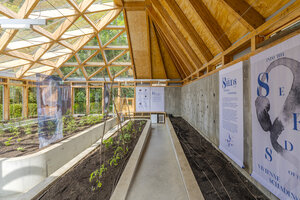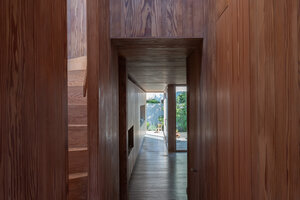
A double-height ark floats above a masonry base & entrance footbridge. Off the elevated living area a smokers' balcony overlooks the lush garden below. Above, semi circular terrace and winter garden nestles within the wooded surrounds.
Birds Portchmouth Russum Architects, 2016

Founded by Sir Roger Cholmeley, Lord Chief Justice of England, in 1565, Highgate School is governed as a single charitable foundation. Highgate School combines Victorian buildings (our Chapel, Central Hall classrooms and Sir Martin Gilbert Library) with modern facilities.
Central Hall Claude Pemberton Leach 1899 , 1865

Jacksons Lane’s year-round programme of contemporary performance, arts participation and cultural education exists to empower, and ignite creativity within, diverse communities & work tirelessly to overcome traditional barriers through art. This year we are celebrating our 50th Anniversary with a wide range of engagement programmes performances and activities.
W.H. Boney, 1905

Discover OmVed Gardens’ new buildings and landscape during London Open House Festival. Piers Smerin’s Douglas‑fir frames and cedar cladding form pyramid silhouettes, with a kitchen crowned by a roof garden. Passive design, raised roofs and oasthouse‑style vents keep spaces airy. Paul Gazerwitz’s hillside paths weave woodland, meadow, veg plots, ponds and orchard into a green village.
, 2025

Victorian/Arts and Crafts church completed in 20C. Imposing west front by J Harold Gibbons with statuary by Dorothy Rope. Lady chapel by Henry Wilson. Stained glass by Margaret Aldridge Rope. Fine Hunter organ plus case.
J. D. Sedding and J. Harold Gibbons, 1888


